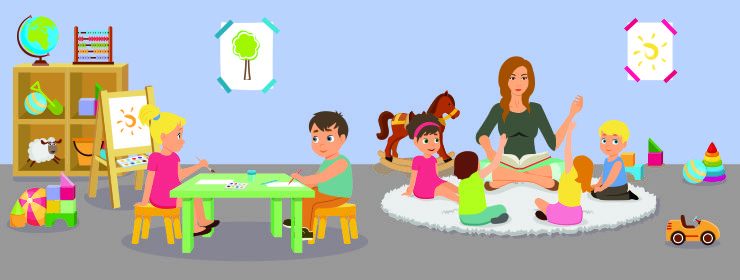Best Ways of Developing Writing Skills in Toddlers

Kids need to have some creative writing skills so that they can express their emotions and exhibit their real selves. For making it work, parents require age-appropriate, level-wise, and class-wise activities planned for the children. If you are a parent who wishes that your kids should write in a fluent and proper manner or should think deeply about various topics, several activities and processes might help you. Parents can help children by guiding them on how to visualize and make choices when working with ideas. Teachers must introduce students to the process of generating and sorting ideas by letting them know how to use resources to build ideas. Kids’ schools are known to do such jobs and that is the reason why parents enroll their children in such schools.
Brainstorming
For great writing, brainstorming is necessary. In order to write something, kids need ways to move from the basic knowledge of the resource material to some separate, more conceptualized, or sophisticated understanding of the topic to write on. The thinking capabilities are often furthered through class discussion and some students automatically move from this initial distribution of ideas into complex, logical interpretations. The process helps them understand the writing styles and they create interesting creative writing habits. But, for the majority of kids, their thinking will remain an unarranged, blank set of ideas of the subject. Here, parents’ and teachers’ intervention is necessary which gives their ideas a solid shape. Teachers can foster a deeper understanding by providing opportunities to kids so that they externalize and fix their ideas on paper and also see their ideas fostering relationships between them too. Make use of these ideas to master the brainstorming stage. But before that, the basic formations of numbers and letters are being shaped by the preschools. The teachers play the major role but parents should be equally involved.
Organize the thought
Once kids start writing something and have something written on the page to work with, they can begin the decision-making process which is crucial to develop a coherent written idea. At this point, kids can choose which ideas are most appealing to them, which ideas seem to fit together, which ideas need to be rejected and which ideas need further exploration. Make use of such ideas to master the ‘organize the thought’ stage within the child. It is important to activate such skills at the right time and the nursery school stage is the best fit for it. Any such school which focuses on child development would try and make it a habit for the child and thus, it will improve the writing skills of a child.
Firstly, Draft the written piece
As students start working with their writing ideas, they also start making a series of choices about their ideas that shall make them feel ready to put them in a more complete form. They should feel “ready to write” their ideas in paper form. But for most, the tough moments of real writing begin at this point. They may still feel that they “have ideas” but have trouble in writing them down on the page. Some kids will suddenly be thrust into “writing a paper” mode and be both constrained and guided by their assumptions about who the reader is, what topic writing really is, and what prior experience has taught them about writing exercises/ assignments. These drafting exercises may ease your kid’s entry into shaping their ideas for a writing assignment.
Make them revise the writing
Ask kids to use simple alphabets or numbers to shape ideas so that they begin to feel the need to test their ideas or move beyond their comfort zones. Sometimes we have ideas that make good sense to us but such ideas might lose or confuse the readers in case we do not frame the thought correctly. Remind students that ideas don’t exist in isolation from words but exist in the words themselves. This organization and choice of words depend upon the audience who is going to ultimately read or listen to the piece of creative writing. Preschools have this habit of making kids revise the written part, again and again, to make them better.



